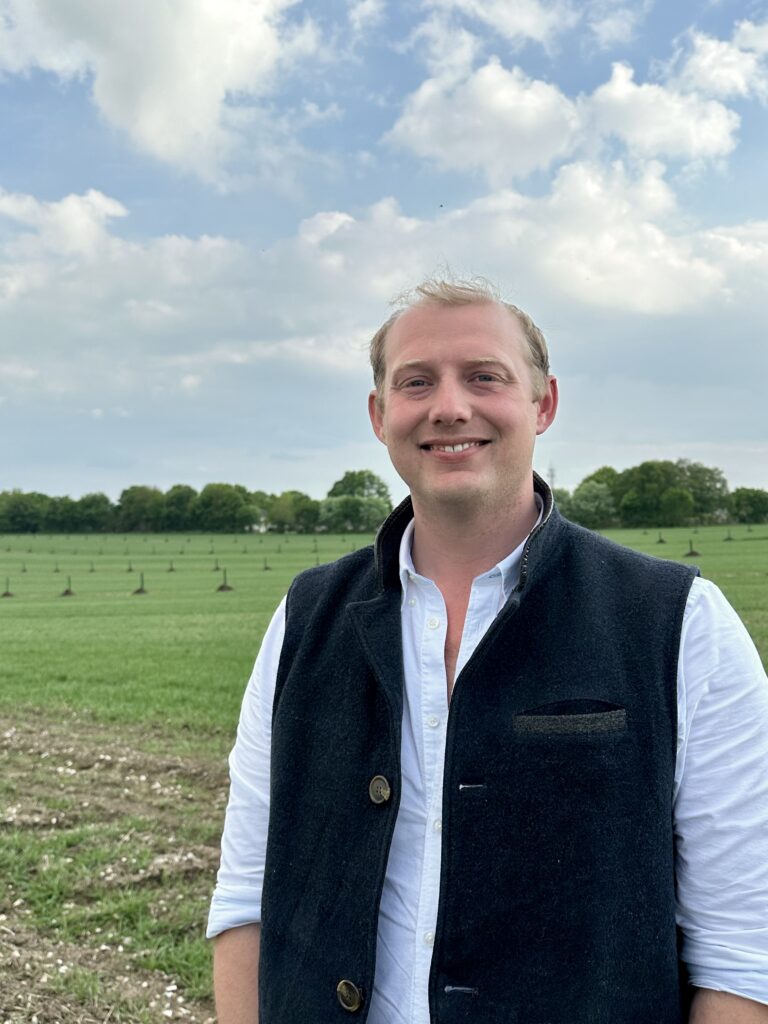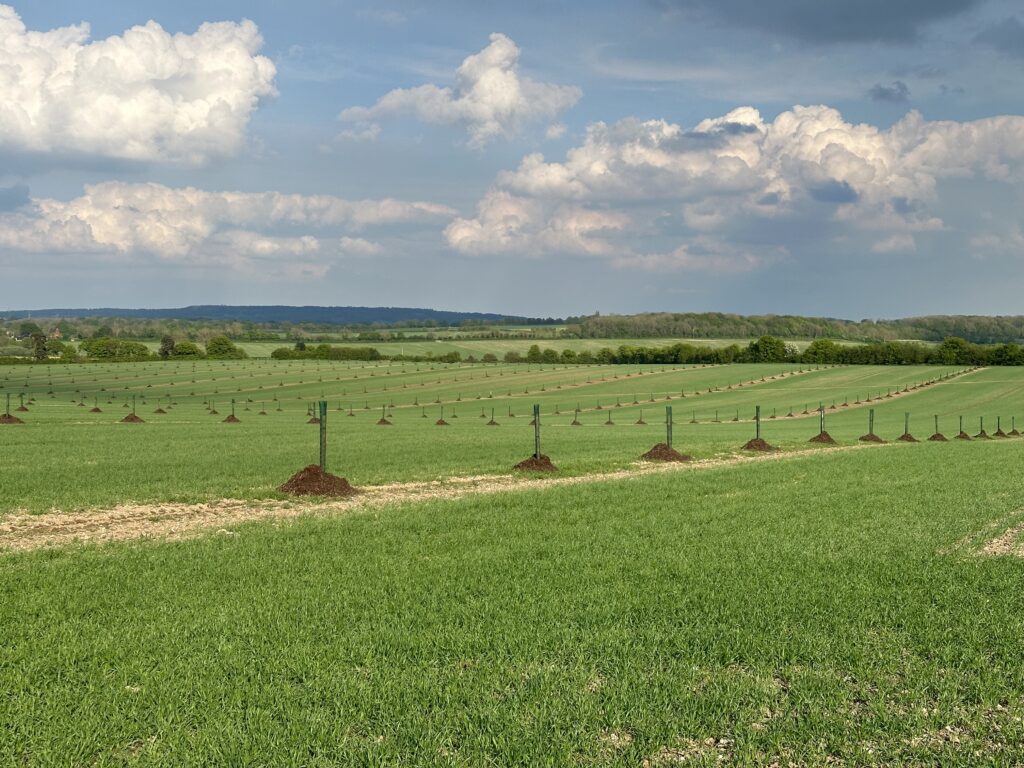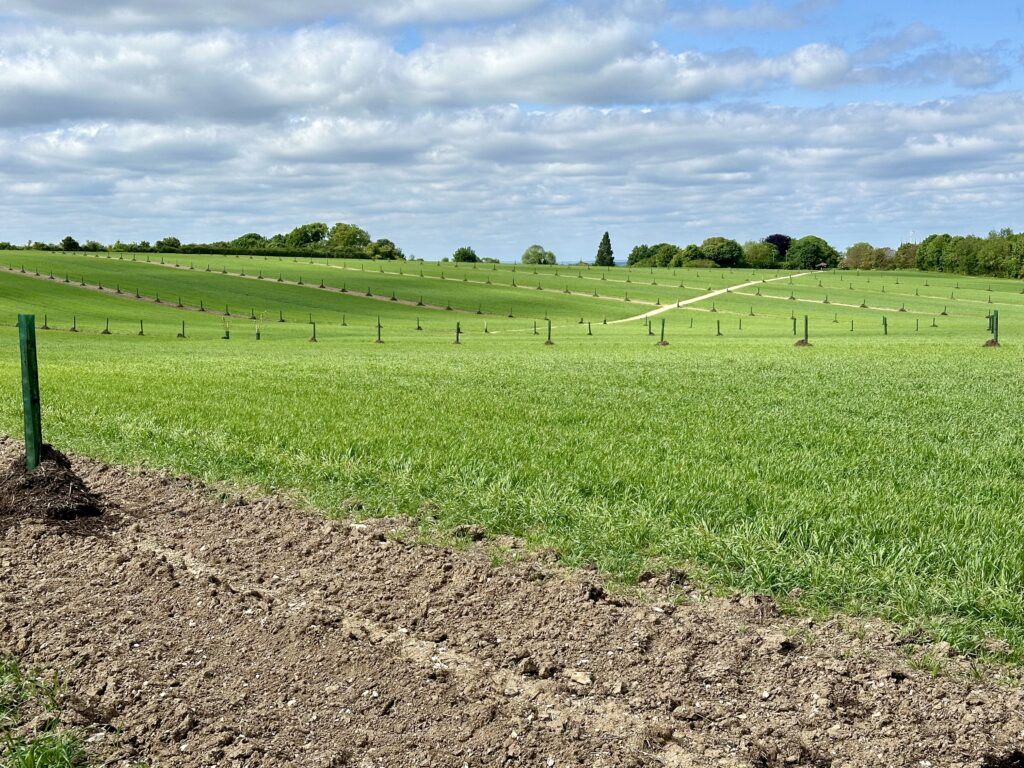Planting the seeds of tomorrow: Agroforestry project
Affinity Water has been working with local farmer, Tom Janaway, to explore how agroforestry can enhance soil health, crop productivity and the water environment. Direct Driller, delves into the project and what this means for the farm’s future.

In the UK, catchment areas are predominantly agricultural land, making partnerships between water companies like Affinity Water and farmers crucial for preserving vital resources such as water and soil.
Agroforestry is a solution for enhancing soil health and Affinity Water is exploring this more as a way of increasing catchment resilience, reducing soil erosion and fixing excess nitrate in soils which can potentially impact groundwater quality.
To take this further, Tom Janaway of Anne Janaway & Sons at Ford Farm received grant funding through Affinity Water’s Soil and Water Innovation Fund to plant an agroforestry system across 30 hectares.
Agroforestry project
Mr Janaway manages the family farm with his brother and mother. The 350-hectare arable farm is in the Loddon catchment, near Basingstoke, Hampshire.
The farm’s crop rotation includes wheat, oilseed rape (OSR), spring barley and more recently intercropping oats and winter beans. Despite their extensive farming experience, the farm has faced increasing challenges related to climate change, prompting them to explore agroforestry.
Mr Janaway explains how agroforestry, the integration of trees and shrubs into crop and livestock systems, offers multiple benefits, such as improving soil health, enhancing biodiversity and providing additional income streams.
He says: “My primary motivation for implementing this project was to ensure the farm’s productivity for my children’s future.”
The project involves planting trees in a 30-hectare field with relatively light chalky soil.
“The field chosen is perfect for agroforestry because it’s vulnerable to variable weather conditions because it doesn’t hold moisture well. The field also runs north-south, ensuring optimal sunlight exposure for the trees,” he says.

“We planted walnut trees at 39-meter intervals, matching our sprayer’s width and to minimise land losses, have included three-meter-wide nectar strips underneath the trees to act as buffer strips. This helps maximise productivity and increases biodiversity at the same time.”
To select the varieties and ensure they were the best for the farm, Mr Janaway worked with professionals.
“By reaching out to horticulture professionals to understand different walnut varieties, I was able to get a better idea as to which ones would work better on the farm.
“I attended a course on growing English walnuts for profit, which also helped me choose the right varieties.”
Walnut trees were chosen for their commercial potential and suitability for the soil and the varieties selected were: Lara, Chandler and Fernette.
Lara is an ancient French variety known for its high-quality nuts, Chandler is a high-yielding California variety and Fernette has good pollination compatibility.
The walnuts are currently being grown alongside spring barley and to ensure the trees do not negatively impact the yield and quality of the crop, root pruning is a critical aspect of the project.
“By using a deep-leg cultivator, we ensure that the tree roots grow downward before spreading out, preventing competition with the crops for nutrients and moisture,” he says.

Although still in the early stages of the project, Mr Janaway remains committed to its success. The next steps involve monitoring tree growth, managing the crops and trees, and exploring markets for the walnuts when matured.
Mr Janaway adds: “I look forward to learning more about tree care, harvesting techniques, and potential markets. For example, I’m looking at if we can make walnut oil or supplying wholesalers with walnuts. “It’s a long-term investment, but I believe it’s worth it.”
Funding the project
Affinity Water is collaborating with farm businesses, like Anne Janaway & Sons, through their Soil and Water Innovation Fund, offering grants of up to £15,000 per business.
This initiative provides financial support for farmers who wish to implement innovative ideas that improve soil health and resilience, which in turn has benefits for water quality and crop productivity.
Brandon Mayuga, Catchment Advisor at Affinity Water, explains why Affinity Water were interested in funding this project.
“As a catchment advisor, I believe we have an opportunity to provide farmers with support and advice on sustainable practices that can benefit their farm resilience and the environment,” he says.
“Agroforestry is estimated to have an output 20% higher than standard monocropped fields through ‘3D farming’, which involves layered farming with crops underneath and nut trees above.
“By farming this system, a significant range of benefits can be achieved.

“A key factor is a greater diversity of rooting behaviours, which not only improves soil structure at different depths, but also helps build soil organic matter which in turn aids carbon sequestration and greater water regulation.
“The trees can also act as windbreaks, protecting crops from wind erosion and reducing runoff, whilst their roots can also reduce waterlogging and flooding,” says Mr Mayuga.
Additionally, agroforestry can enhance crop quality and yields by improving microclimatic conditions and increase biodiversity by introducing multiple species to a monoculture.
Implementing agroforestry requires careful planning and investment, and by receiving a grant from Affinity Water, Mr Janaway explains how this has significantly eased the financial burden to implement the project quicker.
Mr Janaway says: “It was always a long-term plan to implement an agroforestry system on the farm due to the significant benefits it can bring. But by having the grant from Affinity Water it definitely helped with cash flow.”
The broader impact
Mr Mayuga adds: “This agroforestry project is a perfect example of how we want to work with farmers to implement ideas that are of mutual benefit.
“We are very excited to support Tom and look forward to hearing about his experience as the system matures.”
Affinity Water has been proactive in organising workshops and providing resources to farmers about their catchment schemes which are firmly focused on soil health. These workshops bring together experts from various fields to discuss grants, farming techniques and the science behind these practices.
“We recently had a successful agroforestry workshop in the River Loddon catchment in Hampshire, which saw significant attendance and interest.
“The inclusion of agroforestry in SFI is a positive step forward and we encourage farmers to explore the viability of this option,” he says.
Affinity Water at Groundswell
Affinity Water is the largest ‘water only’ company in the UK, serving over 3.8 million customers in the south-east of England.
Affinity Water will be the headline sponsor of Groundswell for seven years in a row, demonstrating their passion to achieve healthier soils and cleaner on farms to create a more resilient future.
They will be showcasing the results of their recent companion and cover cropping trials, innovation projects and wider agricultural schemes.
Delegates are encouraged to visit Affinity Water’s stand and speak to the team.
Farm Facts
Ford Farm, Basingstoke, England
- Name: Anne Janaway & Sons
- Farming: 350 ha arable farm
- Primarily producing wheat, oilseed rape (OSR), spring barley, spring oats and beans.
Affinity Water at Groundswell
- Next to the big top tent
- Rainfall simulator demonstrations – next to Affinity Water stand at 11am each day
- Soil scanner demonstrations to be held on the stand each day
- Free souvenir Groundswell re-usable water bottlesHosting Herts & Middlesex Wildlife Trust on stand




